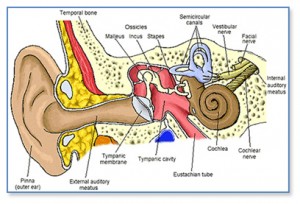Types of Hearing Loss
 There are three main types of hearing loss that occur as the result of problems in the outer, middle, or inner ear: conductive, sensorineural, or mixed hearing loss.
There are three main types of hearing loss that occur as the result of problems in the outer, middle, or inner ear: conductive, sensorineural, or mixed hearing loss.
Sensorineural Hearing Loss
Sensorineural hearing loss, also referred to as nerverelated hearing loss, occurs with problems in the inner ear, which could include:
- exposure to loud noise
- head trauma
- Aging (presbycusis)
- Meniere’s Disease
- Malformation of the inner ear
Sensorineural hearing loss is caused by inner ear or auditory nerve dysfunction, from hair cells being unable to stimulate nerves of hearing, damage to the Organ of Corti, or a metabolic problem with fluids in the inner ear. The neural component may be caused by damaging the Organ of Corti causing the nerves of hearing to degenerate. It may also be the inability of the hearing nerves themselves to transmit neurochemical information.
Sensorineural hearing loss may be caused by exposure to loud noises, or the aging process, also called presbyscusis. Sensorineural hearing loss is typically an irreversible, permanent condition that does not respond to medical treatment. The most common treatment for sensorineural hearing loss is the use of hearing aids.
Conductive Hearing Loss
Conductive hearing loss occurs with problems in the outer and middle ear, which could include:
- earwax buildup
- ear canal obstruction from a foreign object
- ear infections
- benign tumors
- perforated eardrum
- malformations of the outer ear
- hardening of the middle ear bones
Conductive hearing loss is typically the result of a condition that impedes the conveyance of sound through the middle ear cavity to the inner ear, such as a blockage in the ear canal or a disorder that affects the middle ear’s ability to transmit mechanical energy to the stapes footplate. The cause of conductive hearing loss can often be identified and treated medically, for total or partial improvement in hearing.
Mixed Hearing Loss
Mixed hearing loss occurs as a combination of conductive and sensorineural hearing loss. There may be irreversible sensorineural hearing loss resulting from an inner ear or auditory nerve condition, combined with conductive hearing loss resulting from a problem in the middle ear. While the conductive hearing loss may be treatable, the sensorineural hearing loss is most likely permanent. Hearing aids will likely be a good option for this type of hearing loss, following any available medical treatment.
The audiologists at Clarity Audiology & Hearing Solutions, LLC can determine which type of hearing loss you have and recommend the appropriate treatment.
